what does the preamble to the constitution mean
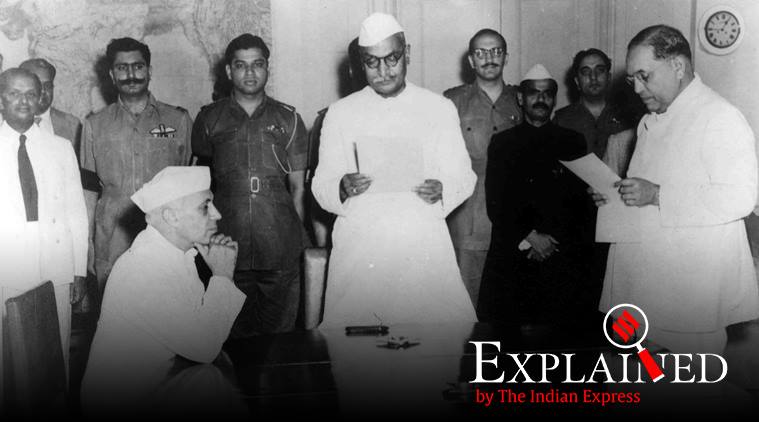 Dr. BR Ambedkar being administered the adjuration of office and secrecy by President Dr. Rajendra Prasad. Pt. Jawaharlal Nehru sits in front of Ambedkar.
Dr. BR Ambedkar being administered the adjuration of office and secrecy by President Dr. Rajendra Prasad. Pt. Jawaharlal Nehru sits in front of Ambedkar.
On Wednesday, the Uddhav Thackeray-led regime in Maharashtra directed rural local bodies to agree a collective reading of the Preamble to the Constitution before flag-hoisting ceremonies, starting Jan 26.
A day earlier, information technology had made it mandatory for school students across the state to read the Preamble during the forenoon assembly.
The decisions have come at a time when protests take erupted confronting The Citizenship (Amendment) Act and the National Register of Citizens across the state.
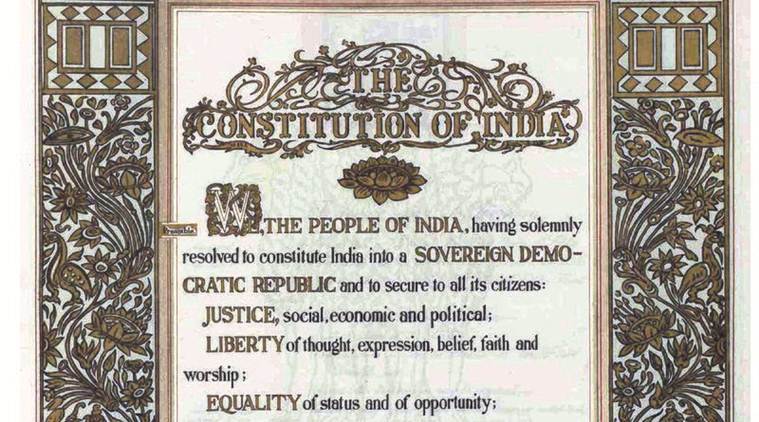
What is a Preamble, and what is the history of the Preamble to Republic of india's Constitution?
A preamble is an introductory statement in a certificate that explains the document'due south philosophy and objectives. In a Constitution, it presents the intention of its framers, the history backside its cosmos, and the core values and principles of the nation.
The ethics backside the Preamble to India'south Constitution were laid downwards past Jawaharlal Nehru'due south Objectives Resolution, adopted by the Constituent Assembly on January 22, 1947.
Although not enforceable in court, the Preamble states the objects of the Constitution, and acts as an assist during the interpretation of Articles when language is plant cryptic.
The Preamble reads:
"We, THE PEOPLE OF INDIA, having solemnly resolved to constitute India into a SOVEREIGN SOCIALIST SECULAR Autonomous REPUBLIC and to secure to all its citizens:
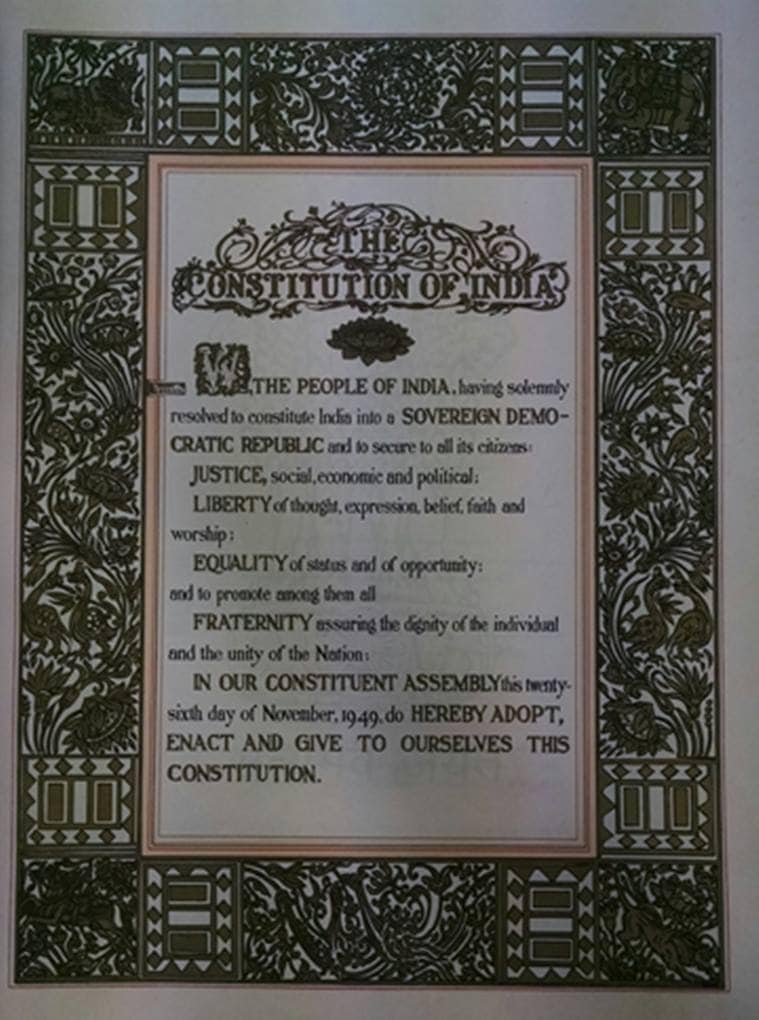 A preamble is an introductory statement in a document that explains the document's philosophy and objectives.
A preamble is an introductory statement in a document that explains the document's philosophy and objectives.
JUSTICE, social, economic and political;
Liberty of thought, expression, belief, faith and worship;
EQUALITY of status and of opportunity;
and to promote amongst them all
FRATERNITY assuring the nobility of the individual and the unity and integrity of the Nation;
IN OUR Constituent ASSEMBLY this twenty-6th day of November, 1949, do HEREBY Adopt, ENACT AND Requite TO OURSELVES THIS CONSTITUTION."
What practise the key words in the Preamble stand for?
The words, "We, the people of Bharat…" indicate the ultimate sovereignty of the people of India. Sovereignty means the independent dominance of the State, non being subject to the control of any other State or external power.
The text declares India to be a "Republic" — indicating a government past the people and for the people.
It states "social, economical, and political justice" as an objective.
Nehru had said in 1956, "Commonwealth has been spoken of importantly in the past, as political democracy, roughly represented by every person having a vote. But a vote by itself does not represent very much to a person who is down and out, to a person, let united states say, who is starving and hungry. Political democracy, by itself, is non plenty except that information technology may be used to obtain a gradually increasing measure of economic democracy, equality and the spread of good things of life to others and removal of gross inequalities."
"Freedom", "equality", and "fraternity" accept also been made ideals.
Dr B R Ambedkar, in his concluding spoken communication in the Constituent Assembly, had said, "Political commonwealth cannot last unless there lies at the base of it social republic. What does commonwealth hateful? Information technology ways a way of life which recognises liberty, equality and fraternity which are not to be treated as separate items in a trinity. They course a union of trinity in the sense that to divorce one from the other is to defeat the very purpose of democracy. Liberty cannot be divorced from equality, equality cannot be divorced from freedom. Nor tin can liberty and equality be divorced from fraternity."
The 42nd Amendment to the Constitution, passed in 1976, replaced the words "sovereign democratic republic" to "sovereign socialist secular autonomous republic". It likewise changed "unity of the nation" to "unity and integrity of the nation".
What practise the Preambles to the world's other Constitutions say?
Us (adopted 1787)
"We the People of the Usa, in Order to course a more perfect Union, found Justice, insure domestic Tranquility, provide for the common defense, promote the full general Welfare, and secure the Blessings of Liberty to ourselves and our Posterity, do ordain and constitute this Constitution for the The states."
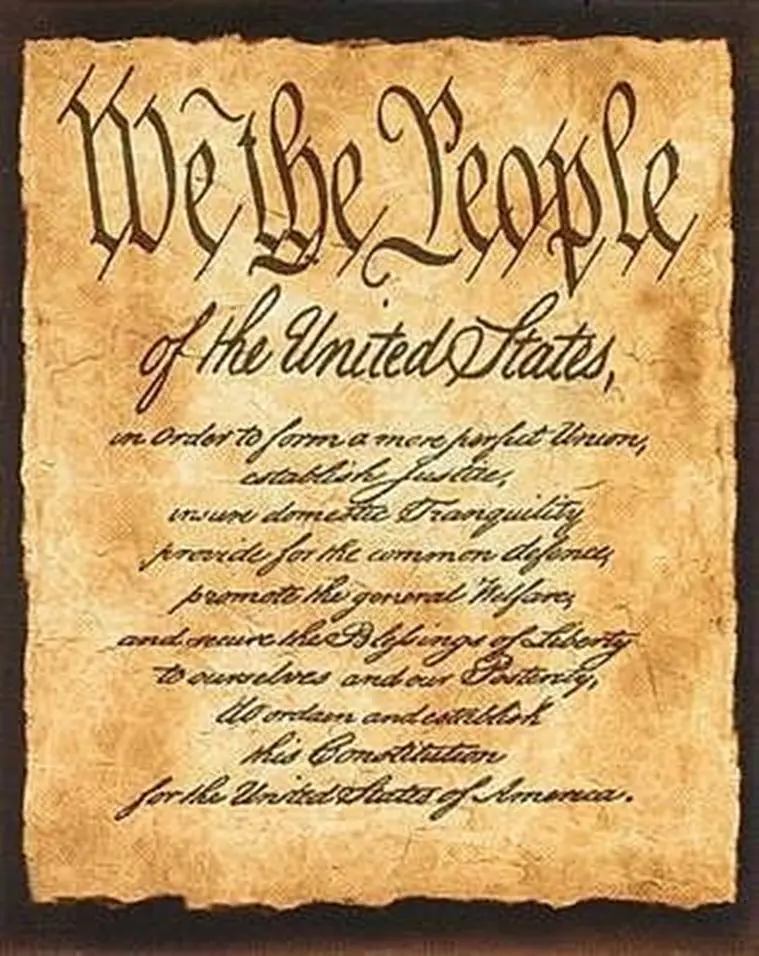
IRELAND (1937)
"In the Name of the Nigh Holy Trinity, from Whom is all authority and to Whom, as our terminal cease, all deportment both of men and States must be referred,
Nosotros, the people of Éire,
Humbly acknowledging all our obligations to our Divine Lord, Jesus Christ, Who sustained our fathers through centuries of trial,
Gratefully remembering their heroic and unremitting struggle to regain the rightful independence of our Nation,
And seeking to promote the common expert, with due observance of Prudence, Justice and Charity, then that the dignity and freedom of the individual may be bodacious, true social order attained, the unity of our country restored, and concord established with other nations,
Exercise hereby adopt, enact, and give to ourselves this Constitution."
Nihon (1947)
"We, the Japanese people, acting through our duly elected representatives in the National Diet, determined that we shall secure for ourselves and our posterity the fruits of peaceful cooperation with all nations and the blessings of freedom throughout this state, and resolved that never again shall nosotros exist visited with the horrors of war through the activity of government, do proclaim that sovereign power resides with the people and practice firmly establish this Constitution. Government is a sacred trust of the people, the authority for which is derived from the people, the powers of which are exercised by the representatives of the people, and the benefits of which are enjoyed by the people. This is a universal principle of mankind upon which this Constitution is founded. We reject and revoke all constitutions, laws, ordinances, and rescripts in conflict herewith.
We, the Japanese people, desire peace for all time and are deeply witting of the loftier ideals controlling human relationship, and we take determined to preserve our security and existence, trusting in the justice and faith of the peace-loving peoples of the earth. We desire to occupy an honored place in an international gild striving for the preservation of peace, and the adjournment of tyranny and slavery, oppression and intolerance for all time from the earth. We recognize that all peoples of the world accept the right to live in peace, free from fearfulness and want.
 (Source: https://nippon.kantei.go.jp)
(Source: https://nippon.kantei.go.jp)
We believe that no nation is responsible to itself lonely, but that laws of political morality are universal; and that obedience to such laws is incumbent upon all nations who would sustain their ain sovereignty and justify their sovereign relationship with other nations.
We, the Japanese people, pledge our national honor to accomplish these high ideals and purposes with all our resource."
Federal republic of germany (1949)
"Conscious of their responsibleness before God and man,
Inspired by the determination to promote world peace as an equal partner in a united Europe, the German language people, in the do of their constituent ability, have adopted this Basic Police force.
Germans in the Länder of Baden-Württemberg, Bavaria, Berlin, Brandenburg, Bremen, Hamburg, Hesse, Lower Saxony, Mecklenburg-Western Pomerania, North Rhine-Westphalia, Rhineland-Palatinate, Saarland, Saxony, Saxony-Anhalt, Schleswig-Holstein and Thuringia accept achieved the unity and freedom of Germany in complimentary self-decision. This Basic Law thus applies to the entire High german people."
French republic (1958)
"The French people solemnly proclaim their attachment to the Rights of Man and the principles of national sovereignty every bit divers by the Proclamation of 1789, confirmed and complemented past the Preamble to the Constitution of 1946, and to the rights and duties as divers in the Charter for the Surroundings of 2004.
Past virtue of these principles and that of the self-determination of peoples, the Republic offers to the overseas territories which take expressed the will to adhere to them new institutions founded on the mutual ideal of liberty, equality and fraternity and conceived for the purpose of their democratic development
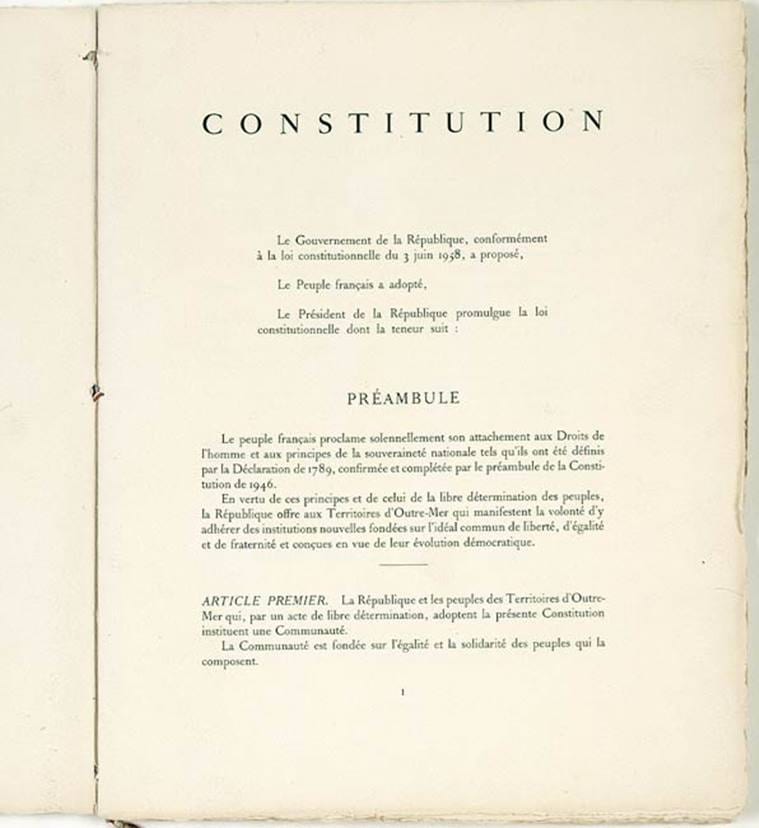 (Source: Wikipedia)
(Source: Wikipedia)
ARTICLE 1
French republic shall be an indivisible, secular, democratic and social Republic. It shall ensure the equality of all citizens earlier the constabulary, without distinction of origin, race or faith. It shall respect all beliefs. It shall be organised on a decentralized footing.
Statutes shall promote equal access by women and men to elective offices and posts besides as to position of professional person and social responsibility."
Espana (1978)
"The Spanish Nation, desiring to found justice, liberty, and security, and to promote the wellbeing of all its members, in the exercise of its sovereignty, proclaims its will to:
Guarantee democratic coexistence within the Constitution and the laws, in accordance with a fair economic and social order.
Consolidate a State of Law which ensures the rule of law equally the expression of the popular will.
Protect all Spaniards and peoples of Espana in the exercise of man rights, of their culture and traditions, languages and institutions.
Promote the progress of civilisation and of the economy to ensure a dignified quality of life for all.
Establish an advanced democratic society, and Cooperate in the strengthening of peaceful relations and effective cooperation among all the peoples of the earth.
Therefore, the Cortes pass and the Spanish people ratifies the post-obit."
THE United nations CHARTER (1945)
"Nosotros THE PEOPLES OF THE UNITED NATIONS Adamant
— to save succeeding generations from the scourge of war, which twice in our lifetime has brought untold sorrow to mankind, and
— to reaffirm faith in fundamental human rights, in the nobility and worth of the human person, in the equal rights of men and women and of nations large and small, and
— to establish conditions under which justice and respect for the obligations arising from treaties and other sources of international law tin can exist maintained, and
— to promote social progress and better standards of life in larger liberty,
AND FOR THESE ENDS
 (Source: un.org)
(Source: un.org)
— to practise tolerance and live together in peace with ane another equally good neighbours, and
— to unite our forcefulness to maintain international peace and security, and
— to ensure, by the acceptance of principles and the institution of methods, that armed forcefulness shall not be used, save in the common interest, and
— to employ international machinery for the promotion of the economical and social advancement of all peoples,
Accept RESOLVED TO COMBINE OUR EFFORTS TO Accomplish THESE AIMS
Accordingly, our corresponding Governments, through representatives assembled in the city of San Francisco, who have exhibited their full powers found to exist in adept and due form, have agreed to the nowadays Charter of the United Nations and do hereby establish an international arrangement to be known as the Un."
Source: https://indianexpress.com/article/explained/the-preamble-what-does-it-say-and-what-does-it-mean-to-india-and-its-constitution-6232014/
0 Response to "what does the preamble to the constitution mean"
Post a Comment